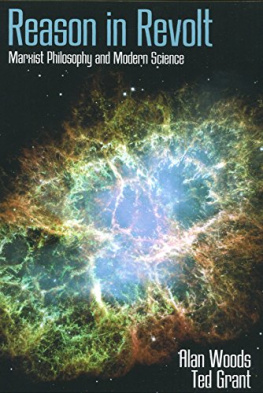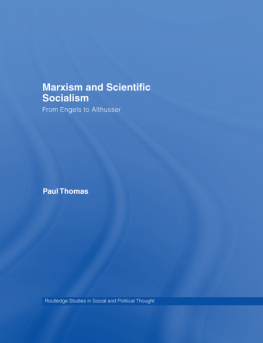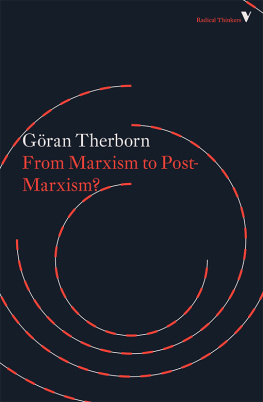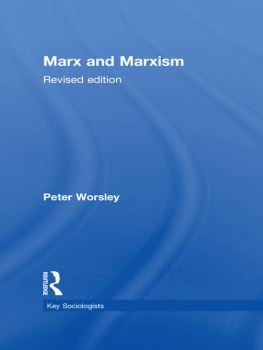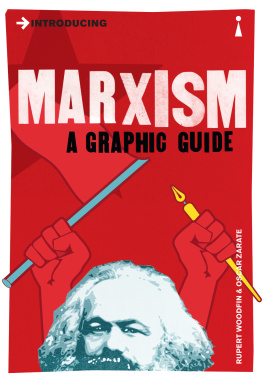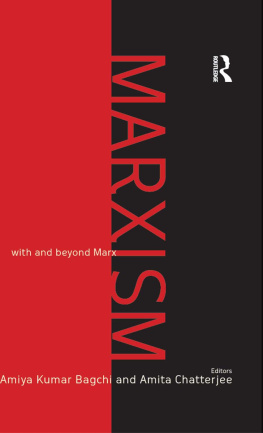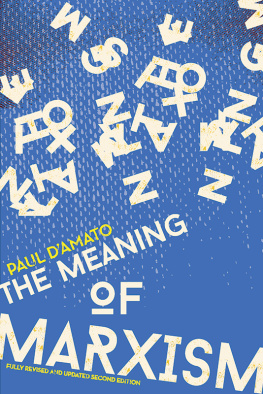What Is Marxism?
An Introduction to Marxist Theory
What Is Marxism? by Rob Sewell and Alan Woods, supplemented by extracts of the works of Karl Marx, Frederick Engels, V I Lenin and Leon Trotsky.
Second edition published in July 2015. Copyright Wellred Publications. All rights reserved.
Ebook published October 2017, Kindle edition.
Based on the first edition published in 2007. Extracts taken from Marx and Engels Collected Works, Lenins Collected Works and the Marxist Internet Archive.
Proofread by Adam Booth, Lee Singh Gill and Fred Weston.
Editing and layout by Wellred Books.
ISBN: 978 1 900 007 71 9
United Kingdom Distribution:
Wellred Books
PO Box 50525
London
E14 6WG
Email: books@wellredbooks.net
Wellred UK online Sales: wellredbooks.net
United States Distribution:
Wellred Books
PO Box 1575
New York
NY 10013
Email: sales@wellredusa.com
Wellred U.S.A. online sales: www.marxistbooks.com
Table of Contents
Introduction
Preface to the First Edition
Socialism, having become a science, demands the same treatment as any other science it must be studied. (Frederick Engels)
W e are repeatedly told, like some old gramophone record stuck in a groove, that Marxism is either irrelevant, or out-dated, or even dead. Yet, if that were true, why are so many books and articles churned out year-on-year attacking Marxism? Clearly the powers that be are rattled or indeed frightened by these dead ideas. This is because Marxism is far from dead. Marxism is, in fact, becoming more attractive in this epoch of instability, crisis, war and the ever-widening gulf between the classes. The old mole of revolution, to use Marxs phrase, is burrowing deep into the foundations of society.
In typical fashion, a recent critic, Niall Ferguson, Professor of Political and Financial History at Oxford, vents his spleen on Marxism by attacking Marx as a washout and a class traitor, for siding with the working class instead of the bourgeoisie. Our learned Professor goes on to brand Marx as the advocate of a socialist utopia [which] turned out to be a corrupt tyranny, presumably a reference to Stalinism, which had nothing in common with Marx or his teachings. Consumed with spite, he then goes on to criticise Marxs Capital as long, verbose, abstruse and ranking as one of the most unreadable books of all time.
Another bourgeois critic, Dominic Lawson, recently peddled the old myth (yet again) that Karl Marxs view was that we are all mere creatures of economic determinism. What we do and what we think have nothing to do with personal autonomy. We are simply cogs in a class-war machine. Such cheap misrepresentations and distortions are pumped out on a daily basis in an attempt to discredit Marxism. However, Marx was never a vulgar economic determinist, where every action is reduced to simple economics. This is a complete distortion.
As Engels explained:
According to the materialist conception of history the determining element in history is ultimately the production and reproduction in real life. More than this neither Marx nor I have ever asserted. If therefore somebody twists this into the statement that the economic element is the only determining one, he transforms it into a meaningless, abstract and absurd phrase.
Take note Mr. Lawson! Engels went on:
The economic situation is the basis, but the various elements of the superstructure political forms of the class struggle and its consequences, constitutions established by the victorious class after a successful battle, etc forms of law and then even the reflexes of all these actual struggles in the brains of the combatants: political, legal, philosophical theories, religious ideas and their further development into systems of dogma also exercise their influence upon the course of the historical struggles and in many cases preponderate in determining their form. There is an interaction of all these elements, in which, amid all the endless host of accidents (i.e. of things and events whose inner connection is so remote or so impossible to prove that we regard it as absent and can neglect it), the economic movement finally asserts itself as necessary. (Engels to J. Bloch, 13 September 1890).
Trotsky also answers this nonsense:
On the question as to how the economic base determines the political, juridical, philosophical, artistic and so on superstructure there is a rich Marxist literature. The opinion that economics presumably determines directly and immediately the creativeness of a composer or even the verdict of a judge, represents a hoary caricature of Marxism which the bourgeois professordom of all countries has circulated time out of end to mask their intellectual impotence. (In Defence of Marxism).
However, despite all the distortions and lies of our enemies, even these critics cannot help blurting out the truth once in a while. Even so, says Professor Ferguson, Marxs insights into capitalism can still illuminate Marx got one thing right (!). Behind the bubbles and busts of the capitalist system there is a class struggle; and that class struggle is the key to modern politics. This is a bold admission from such a biased source. Normally, such ideas are strenuously denied by all bourgeois apologists. Nevertheless, we should not get carried away, after all, one swallow does not make a summer.
So what is this set of ideas that frightens the ruling class and its apologists so much? Put simply, Marxism, or Scientific Socialism, is the name given to the body of ideas first worked out by Karl Marx (1818-1883) and Friedrich Engels (1820-1895) more than 150 years ago. In essence, Marxism is a synthesis of the most advanced ideas at the time: English classical economics, German Hegelian philosophy and French socialism. In their totality, these ideas provide a fully worked-out theoretical basis for the struggle of the working class to attain a higher form of human society socialism.
The component parts of Marxism fall under three main headings, corresponding broadly to philosophy, social history and economics Dialectical Materialism, Historical Materialism and Marxist Economics. These are the famous Three sources and three component parts of Marxism of which Lenin wrote.
The present book comprises the Education for Socialists series and other material which was launched a few years ago to promote the study of Marxism. They were originally intended to assist the student of Marxism by providing a basic introduction to the subject matter, with suitable Marxist texts, that we hoped would whet the appetite for further reading and study. This material, aimed at the first-time reader, is suitable for individual study or as the basis of Marxist discussion groups.
While these introductory articles are illuminating and provide a good start to the subject, there is no substitute for proceeding from there to tackle the classic works of Marx, Engels, Lenin, Trotsky, Plekhanov and others. The newer reader should not be put off by the sometimes difficult and abstract ideas expressed in these writings. Whatever the initial difficulty, a certain perseverance will pay just rewards. Marxism is a science with its own terminology, and therefore makes heavy demands upon the beginner. However, every serious person knows that nothing is worthwhile if attained without a degree of struggle and sacrifice, and that applies to Marxism as well.




